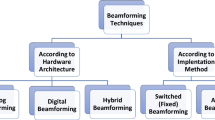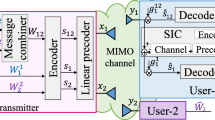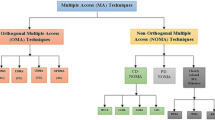Abstract
Energy efficiency is an important metric for downlink transmission in an amplify-and-forward relayaided massive multiple-input multiple-output system, but has not been well investigated. In this work, considering the characteristics of such a system and quality-of-service requirements of users, the energy-efficient joint user association and power allocation problem is studied. First, the closed-form expression of system energy efficiency under the proportional fairness criterion is derived. Then, the proportionally fair utility of system energy efficiency is maximized under constraints of minimum signal-to-noise ratio requirements of users and maximum transmit powers of the base station (BS) and relay stations. As it is difficult to solve this optimization problem directly due to its mixed-integer and non-convex features, the original problem is decomposed into a user association sub-problem and a power allocation sub-problem. For the former, optimum user association is determined by solving a Lagrangian dual problem with a sub-gradient algorithm; for the latter, optimum transmit powers of the BS and each relay station are determined by using Newton’s method. Finally, a sub-optimal solution of the original problem is obtained by a low-complexity iterative algorithm. Simulation results show that the proposed joint user association and power allocation algorithm can offload the traffic of the BS effectively, keep the BS and relay stations operate at low power levels, and improve the system energy efficiency significantly, compared with user association-only schemes.
Similar content being viewed by others
References
M. Shafi, A. F. Molisch, P. J. Smith, et al. 5G: a tutorial overview of standards, trials, challenges, deployment and practice [J]. IEEE Journal on Selected Areas in Communications, 2017, 3(6): 1201–1221
S. Buzzi, I. Chih-Lin, T. E. Klein, et al. A survey of energy-efficient techniques for 5G networks and challenges ahead [J]. IEEE Journal on Selected Areas in Communications, 2016, 34(4): 697–709
T. L. Marzetta. Noncooperative cellular wireless with unlimited numbers of base station antennas [J]. IEEE Transactions on Wireless Communications, 2010, 9(11): 3590–3600
L. Lu, G. Y. Li, A. L. Swindlehurst, et al. An overview of massive MIMO: benefits and challenges [J]. IEEE Journal of Selected Topics in Signal Processing, 2014, 8(5): 742–758
M. Torab, D. Haccoun, J. F. Frigon. Relay selection in AFcooperative systems: an overview [J]. IEEE Vehicular Technology Magazine, 2012, 7(4): 104–113
M. J. Feng, S. W. Mao, T. Jiang. BOOST: Base station on-off switching strategy for energy efficient massive MIMO HetNets [C]//35th Annual IEEE International Conference on Computer Communications, San Francisco, 2016: 1–9
Y. X. Zhu, L. F. Wang, K. K. Wong, et al. Wireless power transfer in massive MIMO-aided HetNets with user association [J]. IEEE Transactions on Communications, 2016, 64(10): 4181–4195
J. Chen, H. B. Chen, H. Zhang, et al. Spectral-energy efficiency tradeoff in relay-aided massive MIMO cellular networks with pilot contamination [J]. IEEE Access, 2016, 4: 5234–5242
A. Q. He, L. F. Wang, Y. Chen, et al. Spectral and energy efficiency of uplink D2D underlaid massive MIMO cellular networks [J]. IEEE Transactions on Communications, 2017, 65(9): 3780–3793
W. Xu, J. Liu, S. Jin, et al. Spectral and energy efficiency of multipair massive MIMO relay network with hybrid processing [J]. IEEE Transactions on Communications, 2017, 65(9): 3794–3809
D. T. Liu, L. F. Wang, Y. Chen, et al. Distributed energy efficient fair user association in massive MIMO enabled HetNets [J]. IEEE Communications Letters, 2015, 19(10): 1770–1773
D. Bethanabhotla, O. Y. Bursalioglu, H. C. Papadopoulos, et al. Optimal user-cell association for massive MIMO wireless networks [J]. IEEE Transactions on Wireless Communications, 2016, 15(3): 1835–1850
A. Q. He, L. F. Wang, M. Elkashlan, et al. Spectrum and energy efficiency in massive MIMO enabled HetNets: A stochastic geometry approach [J]. IEEE Communications Letters, 2015, 19(12): 2294–2297
Y. Lin, Y. Wang, C. G. Li, et al. Energy efficient joint user association and power allocation design in massive MIMO empowered dense HetNets [C]//IEEE 84th Vehicular Technology Conference, Montreal, 2016: 1–6
Y. Y. Hao, Q. Ni, H. Li, et al. Energy and spectral efficiency tradeoff with user association and power coordination in massive MIMO enabled HetNets [J]. IEEE Communications Letters, 2016, 20(10): 2091–2094
E. Bjornson, L. Sanguinetti, J. Hoydis, et al. Designing multi-user MIMO for energy efficiency: when is massive MIMO the answer [C]//IEEE Wireless Communications and Networking Conference, Istanbul, 2014: 242–247
S. W. Huang, H. B. Chen, J. Cai, et al. Energy efficiency and spectralefficiency tradeoff in amplify-and-forward relay networks [J]. IEEE Transactions on Vehicular Technology, 2013, 62(9): 4366–4378
C. S. Zhang, J. H. Ge, J. Li, et al. Energy efficiency and spectral efficiency tradeoff for asymmetric two-way AFrelaying with statistical CSI [J]. IEEE Transactions on Vehicular Technology, 2016, 65(4): 2833–2839
A. Garcia-Saavedra, P. Serrano, A. Banchs, et al. Energy-efficient fair channel access for IEEE 802.11 WLANs [C]//IEEE International Symposium on World of Wireless, Mobile and Multimedia Networks, Lucca, 2011: 1–9
J. Nocedal, S Wright. Numerical optimization [M]. New York: Springer, 2006.
Author information
Authors and Affiliations
Corresponding author
Additional information
This work is supported by the National Natural Science Foundation of China (Nos. 61671165, 61471135), the Guangxi Natural Science Foundation (Nos. 2015GXNSFBB139007, 2016GXNSFGA380009), the Fund of Key Laboratory of Cognitive Radio and Information Processing (Guilin University of Electronic Technology), Ministry of Education, China and the Guangxi Key Laboratory of Wireless Wideband Communication and Signal Processing (No. CRKL160105), and the Innovation Project of GUET Graduate Education (No. 2016YJCX91). The associate editor coordinating the review of this paper and approving it for publication was J. Y. Zhang.
Jing Chen was born in Shandong Province, China in 1989. She received the B.E. degree in communication engineering from Taishan University, China in June 2014 and the M.E. degree in communication and information systems from Guilin University of Electronic Technology in June 2017. Her research is focused on energy efficiency in relay-aided massive MIMO systems.
Hongbin Chen [corresponding author] was born in Hunan Province, China in 1981. He received the B.E. degree in electronic and information engineering from Nanjing University of Posts and Telecommunications, Nanjing, China, in 2004 and the Ph.D. degree in circuits and systems from South China University of Technology, Guangzhou, China, in 2009. From October 2006 to May 2008, he was a Research Assistant with the Department of Electronic and Information Engineering, Hong Kong Polytechnic University, Hong Kong, China. From May 2015 to May 2016, he was a Visiting Scholar with the Department of Electrical and Computer Engineering, National University of Singapore, Singapore. He is now a Professor with the School of Information and Communication, Guilin University of Electronic Technology, Guilin, China. His research interests include energy-efficient wireless communications.
Feng Zhao was born in Shandong Province, China in 1974. He received the Ph.D. degree in communication and information systems from Shandong University, China in 2007. He is now a Professor with the School of Information and Communication, Guilin University of Electronic Technology, China. His research interests include wireless communications, signal processing, and information security.
Rights and permissions
About this article
Cite this article
Chen, J., Chen, H. & Zhao, F. Energy-Efficient Joint User Association and Power Allocation in Relay-Aided Massive MIMO Systems. J. Commun. Inf. Netw. 3, 67–74 (2018). https://doi.org/10.1007/s41650-018-0015-4
Received:
Accepted:
Published:
Issue Date:
DOI: https://doi.org/10.1007/s41650-018-0015-4




